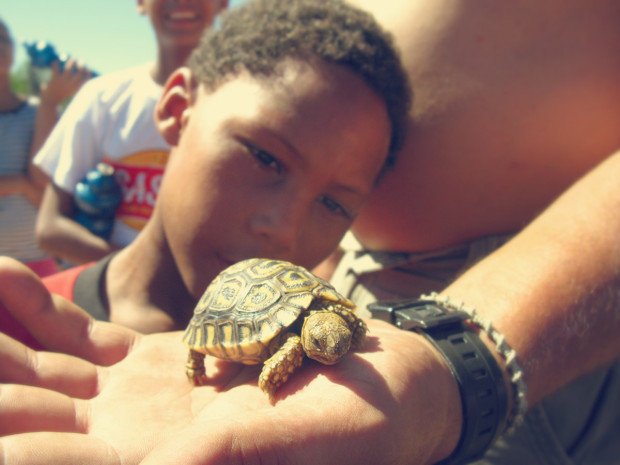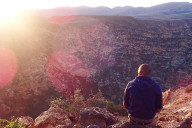Article Review
An very insightful piece of writing can be found in a recent issue of the Journal of Transpersonal Psychology (Volume 42 Number 1, 2010). And timely too because it closely resonates with the theme of “meaningful experience as a catalyst for reconnecting with nature” which defines eyes4earth.org. Author James Swan writes about how our current education systems – with their reliance on pumping out volumes of information – do little to support the cultivation of an “ecological conscience.” Swan suggests that the most effective path to achieve this is “through having powerful exceptional experiences with nature that evoke strong emotional bonding.”
This was the first issue of Transpersonal Psychology I had received since recently subscribing to the journal. And here the very first article dives to the heart of what much of the research underpinning eyes4earth.org explores. Swan gives the impression that this is not a topic which has been given significant attention (by this journal or others) previously.
Swan has impressive credentials and breadth of experience which would be hard to duplicate. He was involved in the working group which coined the term “environmental education” in the U.S during the 1960s and which subsequently defined and shaped the foundations upon which environmental education curricula and policy was built on. Swan has published extensively in scientific and popular literature on environmental education addressing themes such as human behaviour, the power of place, sacred sites and nature as teacher and healer. So he certainly seems well-placed to offer a critique on the state and evolution of environmental education in from 1960 – 2010.
A concise summary of this article is difficult as each paragraph contains cutting insights and reflections. Swan reflects on over four of decades of work in this field and laments that the issue remains one of knowing “how to effectively educate and motivate people to care about ecology so their concern translates into appropriate action.” The implication is that the role of psychology is crucial to these efforts but how to apply it is not necessarily clear-cut.
Swan sets the scene for the recurring schisms and fragmentation we find between, not only nature and psychology, but between fields of environmental psychology and environmental education. He calls for common agreements and synergies to bridge disciplines and efforts… “as well as encourage multiple points of views and theories.”
Drawing from his extensive life experience with efforts aimed at educating and informing the public on environmental issues, Swan concludes that “something else was needed to reliably form environmental attitudes that moved people to action.”
In seeking advice from Abraham Maslow back in 1969 on how to create effective environmental education strategies, Maslow told Swan to “uncover what moved people to develop a passionate love for nature”…and to do this by studying all walks of people who dedicate their lives to striving for “ecological balance” and find out what motivated them or ignited the spark for a love for nature.
Swan took the advice and has interviewed hundreds of people since. He concludes that all exhibit a “passionate, life-inspiring, healing love for nature that is a touchstone of being and a driving force behind conservation action.” He proposes five pathways for achieving this:
- Becoming well-informed;
- Serving a sense of social justice;
- Concern for personal and public health;
- Seeking personal health and fitness; and having
- Profound emotional/spiritual experiences.
It is the profound emotional/spiritual experiences which Swan finds to be the most influential of all and where he found that almost all dedicated conservationists can trace their passion for nature to these exceptional experiences.
The remainder of the article exploresthe character of such experiences and draws on examples of famous achievers such as Robert Redford, Loren Eisely, Aldo Leopold, Jacques Cousteau, Rachel Carson, Thomas Berry and James Lovelock. Swan finds that a “consistent pattern in the lives of many committed environmentalists… is having one of more extraordinary life experiences in nature that seem to ignite a spark in the soul that kindles passionate love for nature. These “significant life experiences” align with what eyes4earth.org terms “meaningful nature experiences”, “profound encounters” or what Maslow termed “peak experiences”.
Swan speculates on the role of the “power of place” in facilitating these significant life experiences in nature. He draws on his three decades of research in documenting (unusual) experiences people have had in visiting special and sacred places. It is candidly acknowledged that science is only really just staring to explore the age-old understanding of “power of place”.
Such places can include natural wilderness areas and Swan acknowledges, like scholars before him as well as any what any experienced wilderness guide will tell you, that: Nature is unpredictable. Such profound experiences cannot be simply manufactured…and we never quite now what to expect form Her.
Swan also acknowledges the occurrence of experiences in nature which seem strikingly similar to what Carl Jung’s description of meaningful coincidences or “synchronicities”…and which seem to arise from “magical harmonies that may or may not be planned or conscious.” We can however expect that such experiences are more likely to arise during wilderness retreats, particularly on solos, though we cannot fully explain the how, when and why.
The article crescendos towards identifying the types of “transpersonal experiences” which may be associated with special places whereby eight categories are identified (Swan explains each category though I will not go into that detail here):
- Unitive bonding with nature: Seeing that everything is connected to everything else, the sense of oneness;
- Feelings of bliss, wonder and awe: Similar to above but cultivates a reverence of one’s part in the unfolding universe;
- Waking visions: Receiving insight into one’s destiny, life purpose or an “intuitive knowing” of events which may unfold;
- Interspecies communication and cooperation: The uncanny appearance of animal which would seemingly to respond to act or thought on the part of the individual moments prior. May spark feelings of joy and pure amazement and deliver a profound personal message;
- Vivid dreaming: Carl Jung spoke about “psychic localization” and this links to the idea of “spirit of place” whereby some places may seem to cause people to have dreams which contain common themes and symbols;
- Hearing unusual sounds and smelling unusual odours: People visiting some “places of power” reportedly sense of odours or sounds which may correspond to the earlier history of the place;
- Ancestral-memory recollections: similar to the above, some people visiting sacred places become aware of emotions, sensations, dreams or intuitions which link to the place visited or are importance to an individual’s life journey;
- Fusion with elements of nature: Similar to the earlier example of “oneness”, some people recount stories (or dreams) of visiting areas and becoming so immersed in the beauty that they become embedded, fused or simply “one” with the elements of nature.
The above reminds me of another example of significant life experiences whereby Indigenous peoples such as southern Africa’s San Bushmen were reportedly capable of “shape shifting” and becoming an animal (at least in a psychic sense at least, although some claim it was also a physical phenomenon). Such events were usually said to occur in the confines of the caves: a “portal” to the Other World.
Swan concludes his comprehensive article with a call to action in harmonizing efforts aimed at bridging disciplinary (research) divides and arriving at shared understanding of such important themes for human existence. Not surprisingly, there is plea to step up current efforts of getting people more in contact with nature. But this eventually needs to be more than just “getting outdoors”. This may be about “journeying” whether it may be to the wilderness, to special places or even through mental imagery processes.
Ultimately, the article aims to find common ground in pursuing the need for fostering an “ecological conscience” in all of us….to simply help humanity live in harmony with nature.
References:
Swan, J. A. 2010. Transpersonal psychology and the ecological conscience. The Journal of Transpersonal Psychology 42:2–25.











Be the first to share a comment